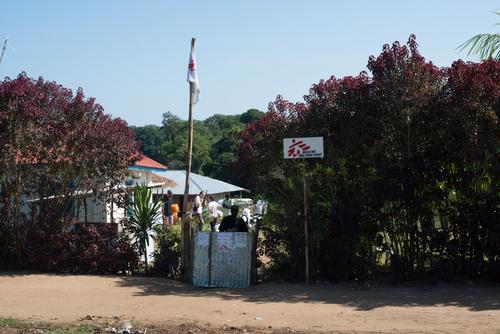- After three months of intervention 65 people have been treated and over a thousand contacts of suspected cases have been tracked
- Last confirmed case was on October 4th
- While vigilance remains, MSF teams have started withdrawing and a treatment centre is delivered to local authorities
Boende (DRC) - The Ebola outbreak that started in August in the north of the Democratic Republic of Congo (DRC) is now under control as no new cases have been detected after the last confirmed infection on 4 October in the town of Boende. Médecins Sans Frontières (MSF), which deployed around 70 members in the area, has withdrawn its teams while surveillance is being sustained. For weeks, efforts have been made to enhance the capacity of local authorities to respond to any eventuality. According to the World Health Organisation, the outbreak in DRC infected 66 people, 49 of whom died.
Usually, an Ebola outbreak is officially considered over after 42 days without a case. “Closing an Ebola intervention has two phases. There is a first period of 21 days after the last confirmed case and during this time one of the main tasks is tracing those who have been in contact with that last patient. Then there is a second buffer period of 21 days to make sure no more cases arise,” says José Mas, coordinator of MSF's intervention.
“At MSF, we try our best to secure an effective and forceful response in the event of a new outbreak. In Congo, we have worked with local authorities to maintain an operational treatment centre in Equateur. We have also made a donation of medicines and equipment for water and sanitation, and the staff is the same that has worked during this last outbreak, so they are properly trained,” he adds. Despite the withdrawal, MSF has teams stationed in other parts of DRC and they could return to the area in case of a new alert. One of those teams is located in the nearby city of Mbandaka, by the Congo River, from where emergency response can be activated if necessary. This outbreak has been registered in the province of Equateur, where in 1976 a new virus was first identified and named after a tributary of the Congo, the Ebola.
The MSF intervention started last July when a survey team was sent to confirm the presence of Ebola in the area. After the outbreak was officially declared, two treatment centres were set up in collaboration with the Congolese government in the towns of Lokolia and Boende. Of the 65 people admitted to the centres, 25 had confirmed infection, 13 were able to recover, and 12 died.
Besides providing attention at the treatment centres, the MSF teams also performed other tasks such as tracking those who came into contact with the patients (more than a thousand people were followed), disinfection of houses and support for safe burials. A very important task was the sensitisation of the local community about the risks of the virus. "Fear is always a problem in an Ebola outbreak. There is a lot of misunderstanding, lots of rumours and misinformation. And information is precisely what it takes to understand the disease and cope with the epidemic," remarks Segimon Garcia, anthropologist and coordinator of the MSF health promotion team in this intervention.
The usual fears aroused by any Ebola epidemic have been accentuated by the huge virus outbreak currently going on in West Africa. The potential economic effects of government actions to tackle the epidemic created concern and caused rejection among the local population.
Unlike the situation in the west of the continent, the outbreak in DRC -the seventh in this country- has been what experts consider a classic outbreak, located in a remote area far from urban centres. "In Congo, there had previously been several Ebola outbreaks but they were curbed among other reasons because they were in the middle of the jungle. Distances are greater there, transportation is more difficult and people cannot move that much, so the outbreak remains limited and contamination is more difficult. In these conditions, the risk of dissemination of the virus is much lower," declares Núria Carrera, coordinator at the Boende treatment centre. In addition to the geographical factor, there was also an appropriate response that managed to contain the epidemic in an early stage. “Containment measures such as contact tracing, an alert system and the medical care of the patients were taken at the right time”, says Mas.



